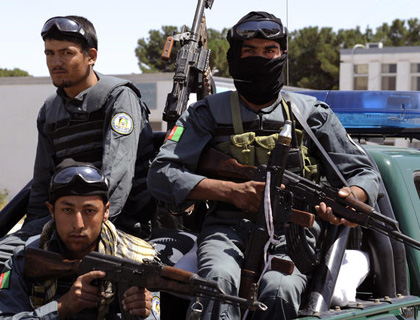KABUL - The International Crisis Group (ICG) issued a report on Thursday on the Afghan Local Police (ALP) and warned that the move to use these unregulated units has not improved security in many places and has even exacerbated the conflict in some districts.
The ALP was started by the U.S in 2001 and has grown over the years into a significant part of Afghanistan's security apparatus.
Today the program consists of about 30,000 militias who are now deployed in 29 of 34 provinces. The members are found in hundreds of rural communities, and serve on the front lines of a war that is reaching heights of violence not witnessed since 2001, said the organization.
According to the ICG these local militia groups "are cheap but dangerous". Too often, the ALP preys on those it is meant to guard and "some members are outright bandits, exacerbating conflict", said ICG.
As such, they urge Kabul to resist calls for their expansion.
The organization states that instead reforms are needed to strengthen oversight, dismiss ALP in many locations where they worsen security and incorporate the remaining units into the Afghan National Security Forces.
Following initial moves by the US to use the militias in areas resistant to outsiders, former president Hamid Karzai eventually accepted the ALP concept in 2009 but insisted the armed villagers would at least be loosely categorized as police and report to the interior ministry.
At the time, Karzai approved a 10,000-strong unit as a two-to-five-year plan. However, according to the ICG, the unit expanded rapidly. Five years later, under President Ashraf Ghani's government, officials are now thinking of expanding this unit to 45,000, stated the ICG.
Officials are also reportedly seeking funding to continue this band of militias once US funding of the program ends in September 2018.
The ICG states in its report that the US and Afghan security officials continue to experiment with other irregular groups. The organization states that Abdul Rashid Dostum, the first vice president, has publicly called for a new force of 20,000.
"Already, security officials are attempting to raise about 5,000 militiamen in at least seven provinces as a stopgap against rising insecurity," read the report.
The organization warns that as Afghanistan faces a growing number of insturgent attacks in 2015 and 2016, government will increasingly look for "quick fixes" in the form of hastily-raised forces with little training.
The ICG states that the ALP program has not improved security in many places and even exacerbated the conflict in a number of districts. "A minority of villagers describe it as an indispensable source of protection, without which their districts would become battlegrounds or insurgent havens, but it is more common to hear complaints that ALP prey upon the people they are supposed to guard."
The report went on to state that: "Such behaviour often provokes violence: in 2014, an ALP officer was three to six times more likely to be killed on duty than his ANSF counterpart. At times, this reflected the way ALP units have become a central part of the war, singled out by Taliban as important targets. In other places, the high rate resulted from abuses – extortion, kidnapping, extrajudicial killings – that instigated armed responses."
ICG warns that the expansion of such forces would be a mistake "but an abrupt halt to the program would give insurgents a military edge, and ex-fighters might also be drawn to banditry and other forms of lawlessness if not carefully reintegrated into society or the ANSF."
They suggest new policies are needed to extend ALP units with proven good behaviour, while reducing the overall force and ultimately ending the program.
"Only a minority of the existing ALP would likely pass muster in such a stringent system, but those remaining should receive pay increases equivalent to those received by the national police (ANP), and adequate support from the government and international community."
However, they state that Washington's allies have been reluctant to get involved with the program, but suggest they set aside their concerns as ALP members become bona fide policemen and leave behind the ALP's history as a U.S. military project.
The International Crisis Group is an independent, non-profit, non-governmental organisation committed to preventing and resolving deadly conflict. (Tolonews)

